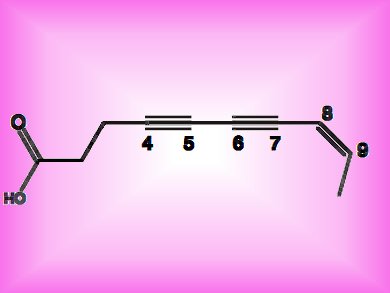Polyacetylenic fatty acids are unsual fatty acids which contain sequences of alternated triple and single carbon-carbon bonds (pictured). These chemicals, produced by soldier beetles to repell predators and pathogens, are promising therapeutic compounds as they possess anticancer and antibiotic activities. Their chemical synthesis is, however, challenging.
Victoria S. Haritos, CSIRO Ecosystem Sciences, Canberra, Australia, and colleagues found a new way to produce these molecules. The scientists discovered that the key enzymes used by soldier beetles to synthetize their major polyacetylenic fatty acid, 8Z-dihydromatricaria (DHMA), are the desaturases CL10, CL4, and CL2. The team showed that these enzymes act sequentially to convert oleic acid into DHMA’s precursor, 9Z,16Z-octadecadien-12,14-dynoic acid. The synthesis of this compound could, therefore, be achieved biochemically by genetic engineering yeasts to express CL10, CL4, and CL2.
This method may enable the production of polyacetylenic fatty acids for medical purposes.
- The convergent evolution of defensive polyacetylenic fatty acid biosynthesis genes in soldier beetles,
V. S. Haritos, I. Horne, K. Damcevski, K. Glover, N. Gibb, S. Okada, M. Hamberg,
Nat. Commun. 2012, 3, 1150.
DOI: 10.1038/ncomms2147



